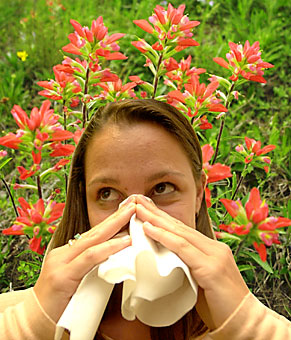 |
|
Photo illustration by DAVID HARDEN/Arizona Daily Wildcat
|
Many UA students, such as sophomore Laura Reichhardt, suffer from spring allergies. Tucson hosts many spring allergens, including wild flowers and dust.
|
|
|
By Sarah Stanton
Arizona Daily Wildcat
Friday, March 26, 2004
Print this
Seasonal allergies can bring fatigue, headache
If the person sitting next to you in class constantly sneezes and coughs, don't worry about getting sick: Allergy season is here.
Michael Schumacher, professor of medicine and pediatrics, said college students are most at risk for developing allergies.
He said that's because their immune systems are finally formed, and their bodies are "sorting themselves out."
According to Schumacher's Web site, which is sponsored by the allergy/immunology section of the pediatrics department, seasonal allergies bring symptoms such as nasal stuffiness, sneezing, watery red eyes, fatigue and headache.
Many of the plants that bloom in Tucson during the spring can cause allergies, Schumacher said.
He named pollen from cottonwood, palo verde and olive trees as some of the culprits, adding, "Bermuda grass is one of the worst."
Schumacher said many people are also allergic to house dust mites and mold.
While many over-the-counter and prescription allergy medications can alleviate symptoms, they are only temporary solutions, Schumacher said.
"There is no cure, but you can be made a lot better," he said.
Schumacher named several treatment options for the allergy sufferer. He said the type of treatment will depend on the severity of the allergies and the reaction of the patient to different medicines.
Over-the-counter medicines, such as Benadryl, Tavist and Claritin, are some of the most popular treatments, Schumacher said.
But he expressed caution in using antihistamines such as Benadryl because of their tendency to cause sedation in the user.
"Benadryl is a really bad one and should only be taken at night," he said.
Schumacher noted that some other antihistamines are less likely to cause sedation, but should still be used with caution.
"Don't drink alcohol with any of the first-generation antihistamines, such as Tavist," he said.
Claritin, which recently became available without a prescription, almost never causes sedation, Schumacher said.
Schumacher advised that if allergies get in the way of everyday activities, the sufferer should make an appointment with an allergist.
Ellen Hall, a pre-business senior, said her allergies have been unusually severe this year.
"My allergies have really been bothering me. It seems like they're worse than usual," she said.
Schumacher added that recurring sinus infections, asthma and an inability to sleep are also cause to visit an allergist.
Hall said her allergies are usually accompanied by asthma symptoms.
Schumacher said the first thing an allergist will do in an initial visit is take an in-depth health history from the patient.
"All allergists will take a history from you. It's 90 percent of the diagnosis," he said.
Schumacher said the history can help the allergist determine what allergens may be triggering the patient's symptoms.
There are also several different tests to determine whether a patient has allergies.
"Skin tests or blood tests are the most common methods for determining your allergic triggers," states the American Academy of Allergy, Asthma and Immunology Web site.
Schumacher said these screenings usually test for 30 to 50 allergens at once.
He also said several lifestyle changes can reduce allergy symptoms. He recommended that allergy sufferers keep pets out of the bedroom and out of the house if possible.
Sufferers should minimize the number of potted plants in their houses because they can grow mold, Schumacher said.
Finally, he recommended replacing old carpet with tile, especially in bedrooms, and wearing a pollen mask when doing yard work.
The UA allergy Web site also recommends that allergy sufferers "drive with the windows up and the air on recirculate." The Web site is located at peds.arizona.edu/allergyimmunology/southwest.
